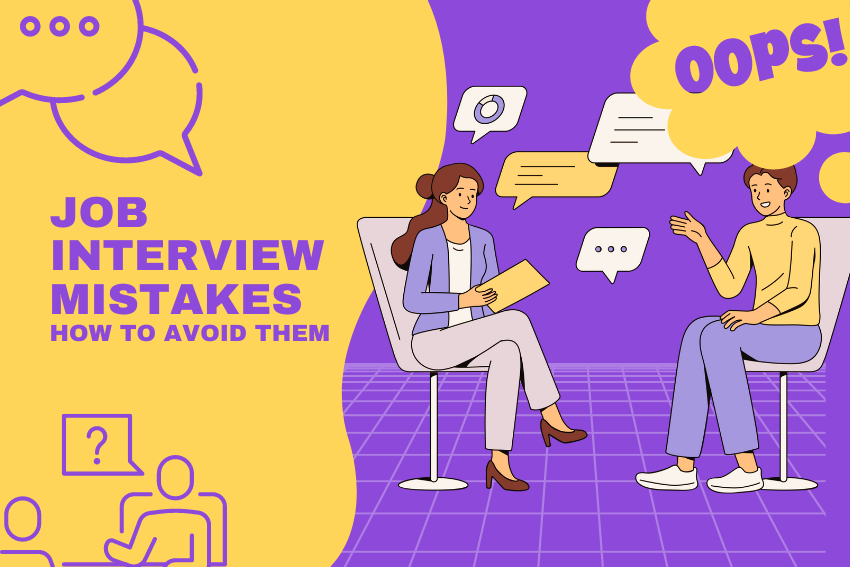Introduction to Job Interview Mistakes
Candidates must avoid common job interview mistakes as they can destroy even the best qualifications and preparation, it is important to do so in order to succeed in the job interview.

Interviews are one of the most critical stages during the job search process since they offer you a platform on which to present yourself to the employers. But they can also be panicky and you can easily make mistakes that may deny you the job you so much desired. Pre-Interview mistakes, wrong attitude during the interview and wrong choice of words during the interview are some of the basic Interview mistakes that can however be avoided.
In this article, we will discuss on job interview mistakes and how to avoid them. We shall be able to assist you on how to survive the current stiff competition in the job market.
10 Common Job Interview Mistakes
Here are some of the most common job interview mistakes and tips to avoid them. So, any candidate stands a better chance of presenting themselves during the interview with a clearer stand.
Not Researching the Company or Role
Job interviews are an area that will always require preparation. If you do not take your time to research about the company or the position you are applying for you will have the company and or your interviewer thinking you are not serious with the job. Some of the questions that interviewers pose is as those with the following examples, “What do you know about us?” or “That can be translated into, why are you seeking employment with this company?” Stuttering over these questions will make you come out as unprepared and apathetic.
How to Avoid This Mistake:
- Research the Company: Learn as much as you can about the company’s performance, its goals and objectives, values, and achievements over time and its general business strategy.
- Understand the Role: Study the job advertisement carefully and see that you have a match with the qualifications of the job. Count cases where you exhibited the competencies that they are seeking at the workplace.
- Prepare Answers: Candidates should practice include how to answer questions like “Can you tell me about yourself?” or “What are your strength and weaknesses?”
Key Tips:
- Take time and check the company’s website & also the LinkedIn company page.
- It is beneficial to focus on the latest events for the given company with concern to achievements or problematic situations.
- Prepare a few questions to ask the interviewer based on your research.
Being Late or Too Early
Interview setting is sensitive when it comes to time management. Getting to the venue late gives a poor first impression disappointing the interviewer after wasting their time. However, learning to arrive too early is also unhelpful since it may cause pressure on the interviewer.
How to Avoid This Mistake:
- Plan Your Route: Should the interview be conducted face to face, ensure you organize your transport and arrive on time, if there will be traffic congestion or problems finding a parking space among other hitches.
- Aim for Perfect Timing: Goal to reach 10-15 mins prior to the scheduled start of the event. This proves one is on time without having to cause a disturbance.
- Confirm the Details: This is most important if you have many interviews in a day, check the time, date, and location of the interview again.
Key Tips:
- If running late, notify the interviewer as soon as possible.
- Turn on a GPS app or a map service to know the current traffic situation.
- If you are conducting an interview online, it is wise to sign in about 10 minutes before the actual start of the interview to be sure that everything is fine.
Dressing Too Casual or Too Formal
Interviewers are conscious of the look of the candidates they are interviewing. Dressing too formally can give the impression that you are not very serious with the processes involved in the selection. It is always important to come to the right balance.
How to Avoid This Mistake:
- Research the Company Culture: It is usually possible to note that the dress code of the company might be a mirror of the company’s culture. For instance, technology-based start-ups are conceived with a relaxed dress code, unlike corporate innovation financiers.
- Err on the Side of Caution: It is safer to dress in any way related to business casual or formal dressing.
- Grooming Matters: Please ensure that your clothes are clean and well ironed, that you have trimmed your hair and facial hair if necessary and that your skin is and clean shaven.
Key Tips:
- Check the dress code on the company’s website or through photos of existing employees on a site like LinkedIn.
- Do not wear any form clothing or accessories that is attention seeking or seize the attention of others easily.
- Wear things which you are comfortable in – they give you more confidence.
Being Either Too Arrogant or Too Nervous
A good job interview relies on confidence, but too much confidence can come across as arrogance. Instead, while nervousness or insecurity can be shown, doing so too much can prompt the interviewer to suspect that you are not cut out for the role.
How to Avoid This Mistake:
- Practice: The more you practice gives you comfort with your answers and body language which in turn gives comfort during the interview.
- Balanced Approach: Be humble enough to admit you still have areas to improve upon, while proving to people that you are confident in who you appear to be.
- Positive Body Language: Maintain eye contact, smile, and keep an open posture to exude confidence without arrogance.
Key Tips:
- Do not break in the interviewer or blow yourself up on your own reputation.
- If you are nervous, then take deep breaths to calm yourself before you respond.
- Use self-deprecating humor cautiously—it can show humility but avoid diminishing your accomplishments.
Rambling or Giving One-Word Answers
Getting the right balance in the frequency of sending emails but not being too verbose and too brief is tough. If your answers in response to the questions are rambling, you will seem unfocused, and with a single word response, you could come across as unprepared or disinteresting.
How to Avoid This Mistake:
- Prepare Concise Responses: Practice answering questions in a structured way. The trick here is the STAR technique (Situation, Task, Action, and Result) to prevent a long, meandering story.
- Engage in a Conversation: View the interview as a dialogue rather than a one-way street. Aim to keep the conversation flowing naturally.
Key Tips:
- Make time during mock interviews to watch yourself and see how long it takes to answer your questions.
- During practice sessions ask for feedback from a friend or mentor.
- So be aware of cues from your interviewer—if they are looking anywhere other than your face, it might be time to end your response.
Not Showcasing Your Accomplishments
Some candidates are just too modest and, in real life, they might downplay their skills or achievements during the conversation with the interviewer and miss a great opportunity to impress them.
How to Avoid This Mistake:
- Be Prepared to Brag (Gracefully): Emphasize your most important skills and work things so that it fits with the company’s needs.
- Use Metrics: Wherever possible, use specific numbers to show the impact you can have when in previous roles. Say, for instance, “I helped increase sales by 20 percent is more impressive than I increased sales.
Key Tips:
- Train yourself to give answers that suit the job’s demands.
- List 3 -5 key accomplishments to keep a list of and you can refer them during the interview.
- Practice saying what you have done without sounding arrogant.
Speaking Negatively About Past Employers
If you quit your job in a messy way, then badmouthing your previous employer or his staff is a big red flag to most interviewers. It means that you might not be too professional or if you bring negativity into the new workplace.
How to Avoid This Mistake:
- Stay Positive: Even if you never worked somewhere ideal, make sure you look back on what you learned. Turn around any bad experience into a chance learning opportunity.
- Avoid Personal Grudges: Instead, stay on topic with the facts of why you are moving on and do not let emotion interfere.
Key Tips:
- Practice good, neutral, professional ways of talking about difficult situations.
- Focus on areas you would like to gain in the new role, not on things that have failed in the past.
- Use phrases like “It wasn’t the right fit” or “I’m seeking new challenges” rather than detailing grievances.
Failing to Ask Thoughtful Questions
It is a good idea to ask questions at the end of an interview, otherwise it will look like you are not interested. In other words, while asking the wrong types of questions such as those centered around salary or benefits only, can be off putting.
How to Avoid This Mistake:
- Prepare Questions in Advance: Instead, ask questions that will show genuine interest in the role, questions about the company and its culture.
- Avoid Overly Personal Questions: Keep it job focused, team focused and growth opportunities.
Key Tips:
- Ask about team dynamics, company goals, or the interviewer’s experience with the company.
- Avoid salary and benefit questions until an offer is on the table.
- Have at least three questions prepared, so you are ready if some are already addressed during the conversation.
Poor Body Language
Avoiding eye contact, slouching, or even fidgeting can all send unintentional messages to the interviewer, rephrasing that your confidence level is down, that you are disengaged. A lot of the time, words are not needed.
How to Avoid This Mistake:
- Maintain Good Posture: The interview is an easy one, so sit up straight, and carry yourself with a confident posture throughout the interview.
- Eye Contact and Smiles: Make regular eye contact and smile naturally to show engagement and warmth.
Key Tips:
- Practice in front of a mirror or with a friend to identify any nervous habits.
- Give firm handshakes and avoid crossing your arms.
- Be aware of how you come across physically, as it can affect how your words are perceived.
Not Sending a Thank-You Note
After an interview it is just a simple thank you email that can go a long way and keep you top of mind. Not sending one can come off as not being enthusiastic, or unprofessional.
How to Avoid This Mistake:
- Send a Thank-You Email: Write and send a short, personalized thank you email within 24 hours of the interview.
- Reiterate Your Interest: Give your hope a chance and thank them for the chance as well.
Key Tips:
- Mention something specific from the interview to make your email stand out.
- Keep it concise—do not go overboard with flattery or unnecessary details.
- If you interviewed with multiple people, send a note to each interviewer.
Conclusion: Avoiding Job Interview Mistakes for Success
By preventing these common job interview mistakes, you will stand a huge chance of making a positive impression. If you prepare well, present your skills effectively and stay professional the whole time, you are going to look like a very strong candidate for any role. Some people say that interviews are only about the details, but really it is all about the little details, so take each step with care and you will be one step closer to landing your dream job.


